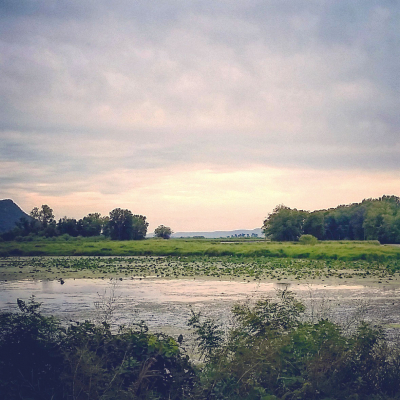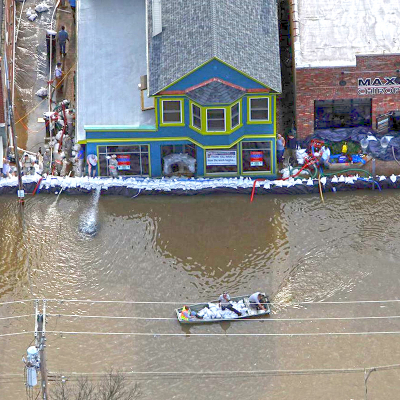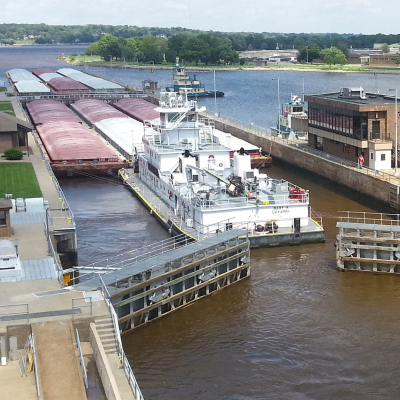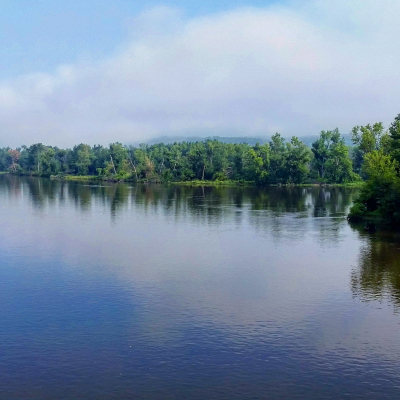Managing floods, droughts, and sediment on the Upper Mississippi River, with its vast geographic scale, tremendous economic productivity, and globally significant resources, presents extraordinary challenges and opportunities
UMRBA is bringing together those who live and work in the floodplain to improve disaster preparedness, economic growth and resilience, and ecological health. The purposes being to a) increase the economic, ecological, and social resilience of the Upper Mississippi River to major flood events, prolonged drought, and excessive sediment; and b) foster dynamic, balanced, objective, and adaptive approaches to flood, drought, and sediment management in a multi-purpose management context.
Solutions are achievable but reside in our ability to work together and make decisions for today and the future. The discourse will be contentious and implementing solutions will always remain challenging. The issues are personal and involve peoples’ families, homes, and livelihoods as well as habitat for fish and wildlife. UMRBA is committed to providing a fair and objective forum for affected interests to learn from one another and seek opportunities to collaborate rather than conflict. We have found that many floodplain communities relate to one another through their mutual experiences living and working alongside the dynamic river-floodplain.
Objectives
- Develop an integrated, comprehensive, and systems-based approach to minimize the threat to health and safety resulting from flooding by using structural and nonstructural floodplain management measures
- Develop new, or renew existing, comprehensive long-term channel management strategies that are sustainable, cost-effective, and ecologically sensitive
- Develop mitigation strategies for multi-year drought events that would increase the resilience of communities and economies adjacent to, or dependent on, the river
- Seek opportunities to support environmental sustainability, restoration, and water quality goals for the Upper Mississippi and Illinois Rivers
- Accelerate efforts in the watershed that reduce the volume and rate of runoff to the Mississippi River
Key Documents and Links
References
Planning Objectives (2022-2024)
UMRBA Resilience Planning Fact Sheet (March 2021)
Keys to River Report Meeting Summaries
2019 Open Session Notes (Coming Soon!)
2017 Flood and Sediment Management Summary
Channel Maintenance Issue Assessment
UMRBA Statements
March 2021 Letter to USACE Headquarters
[Other Statements Coming Soon!]
Regional Consent
UMRBA is committed to providing a fair, objective, and inclusive forum for people, communities, and businesses in the Upper Mississippi River floodplain affected by floods, droughts, and sedimentation to learn from one another and seek opportunities to collaborate. We are adopting principles of the Systematic Development of Informed Consent (SDIC) methodology to ensure that those affected by the work are knowledgeable of, and consent to, the selected plan and the resulting impacts to them. This SDIC methodology requires that the affected interests are involved in deliberations throughout the planning process and have ample opportunity to provide their perspectives and opinions. It also requires that the project planners listen to, and reflect on, stakeholder input.
UMRBA's goals for systematic development of informed consent is to create a commonly-held vision with shared goals, objectives, and implementation strategies that are regionally supported among stakeholders. This requires a collaborative, consent-based planning process to:
- Build understanding and mutual acceptance and empathy of the challenges affected interests face living and working in a highly dynamic river-floodplain and ideas for addressing local and regional issues
- Guide deliberations that foster productive discourse among affected interests and state and federal government agencies in the development of solutions and prioritization of investments
- Improve, leverage, and better utilize knowledge that is used to inform the deliberation of solutions
- Establish and maintain the legitimacy of the planning process, outcomes (including decisions and assumptions), and public and private agencies/entities that will work to advance the outcomes
- Motivate productive action that advances the path forward following the plan’s acceptance




